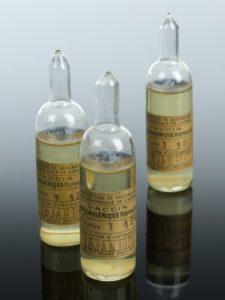
Three glass ampoules of cholera vaccine, Paris, France, 1924
Credit: Science Museum, London. Wellcome Images
Cholera, caused by Vibrio cholerae, is a diarrhoeal waterborne disease associated with poor sanitation and lack of clean drinking water. An estimated 95000 deaths occured due to cholera, of which half of the deaths are in children under 5 years of age. The current strategy endorsed by the World Health Organisation (WHO) to combat cholera is the provision of clean water and promotion of good water, sanitation and hygiene (WaSH) practices. However, this is a great challenge to achieve, particularly in Sub-Saharan Africa.
An effective vaccine against cholera could have a great impact in reducing morbidity and mortality due to the disease. There are three WHO pre-qualified oral cholera vaccines, Dukoral®, Sanchol® and Euvichol™, of which none of them have been fully endorsed. The current suggested guidelines by the WHO for the use of cholera vaccines in endemic countries, is the vaccination of individuals to prevent the spread of cholera outbreaks, and vaccination of travellers from non-endemic countries.
All three pre-qualified vaccines, are killed whole cell vaccines which require at least 2 doses to provide protection for 2-3 years. There is renewed interest for the re-introduction of the live attenuated single dose cholera vaccine containing the CVD 103-HgR V.cholera strain. CVD 103-HgR strain does not produce active cholera toxin, has been shown to be safe and provides protection in some clinical stud as early as eight days post vaccination, with a protective efficacy of 90% at 10 days post vaccination.
A phase 3 study (3146 participants) conducted by PaxVax aimed to further characterise the safety and immunogenicity of PXVX0200 -re-developed CVD 103-HgR V.cholera vaccine strain- as well as demonstrate immunological equivalence of different vaccine lots. PXVX0200 induced Serum Vibriocidal antibody in 96% of vaccinated individuals, with 94% of vaccinees seroconverting by Day 11 post vaccination and all vaccinees by day 29 post vaccination. Researchers observed very similar seroconversion rates with the different lots of PXVX0200 vaccines, illustrating very low to non-existent changes in immunogenicity due to vaccine lot to lot variability. As the vaccine is a live attenuated replicating bacterium, safety is a major concern, particularly if it shall be given to immunocompromised individuals. Overall PXVX0200 vaccine was safe, however an estimated 4% of vaccinated individuals compared to 1.2% placebo recipients experienced diarrhea of any severity 24 hours post vaccination.
PXVX0200, the redeveloped CVD 103-HgR V.cholera vaccine strain, was shown to be highly immunogenic and in other studies to have an efficacy of 80% 3 months post vaccination. This article highlights the potential for the use of live attenuated Cholera vaccine, however, the safety profile observed in the study will require further investigation for use in young children.
Journal Article: McCarty et al. 2018. Safety and immunogenicity of single-dose live oral cholera vaccine strain CVD 103-HgR in healthy adults age 18–45. Vaccine
Journal Article: Cheleka AM Mpande











